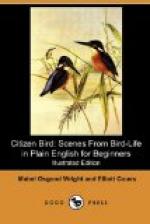The Golden Eagle, who sat at the foot of the table, was about the same size and an equally handsome bird. He held his golden-brown head proudly erect, and his black wings folded tightly. He too had some white feathers in the tail, though none on the head; his hooked beak was black, and he wore dark leggings almost down to his powerful claws.
These two Eagles, though not exactly friends, are not enemies; for the Bald-headed one ranges over all of North America, especially in open places near the water, while his Golden brother keeps more to the western parts, and loves the loneliness of cold northern mountains.
“We Birds of Prey,” said the Eagle, “who bow to no one and even sleep sitting erect—we, whose females are larger than the males for the better protection of our nests, are accused of eating not only our smaller brethren, but also four-footed animals which are of service to man. I deny that we do this as a tribe, except when we are pressed for food, and Heart of Nature says to us all, ‘Take what ye need to eat!’
“Now, you are all in honor bound to speak the truth at this hearing, and you shall be heard first, Brothers of the Darkness—you, with strange voices and feathered eye-circles—you, who have three eyelids and whose eggs are whiter even than moonlight.
“Brother Screech Owl, whose day is my night, tell us about yourself—how and where you live.”
[Illustration: Screech Owl.]
There were two Screech Owls perched side by side on one stump. They were not ten inches long, and had feathery ear-tufts standing up like horns an inch long. One Owl was mottled gray and black; the other was rusty-red; and the toes of both peeped out of holes in their thin stockings. The gray one gave a little quavering wail and said:
“I am everywhere a well-known Owl; though I say it myself, I am a good, hard-working Citizen, and in this the Wise Men agree.
“My family are also distinguished by two other odd habits. Having two sets of eyelids, an inner and an outer, we can close one or both at will. The inner one is a thin skin that we blink with, and draw across our eyes in the day-time when the light annoys us, just as House People pull down a curtain to shut out the sun. The outer lids we close only in sleep, when we put up the shutters after a night’s work, and at last in death—for birds alone among all animals are able to close their own eyes when they die. The other habit is the trick of turning our heads entirely round from front to back, without wringing our necks or choking to death. This we do to enable us to see in every direction, as we cannot roll our eyes about as freely as most birds do.
“Come to think of it, I am very fond of eating one bird that, so the Wise Men say, is as bad as a mouse for mischief. I eat English Sparrows!
“One thing I wish the Wise Men would tell me. Why am I, without season or reason, sometimes rusty-red and sometimes mottled gray? It confuses my brain so that I hardly know my own face in the pond.”




